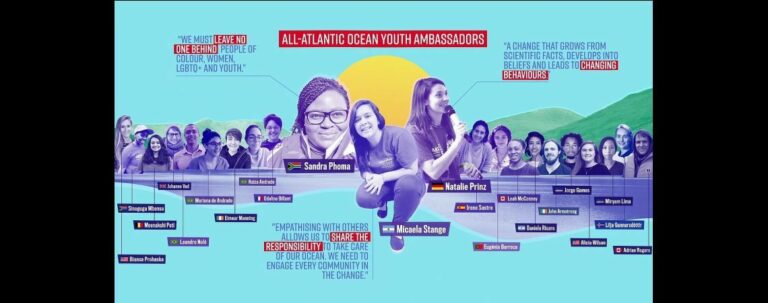The youth of the world have stepped up in recent years, and that is no different for the All-Atlantic Ocean Youth Ambassadors. Twenty-three Youth Ambassadors from fifteen countries connected to the Atlantic Ocean are reshaping ocean climate action.
The Youth Ambassadors are a group of young researchers who were selected to participate in the first All-Atlantic Ocean Youth Ambassadors Summer School in Galway, Ireland, from the 23rd to 27th of August 2019. Their enthusiasm was palpable from the beginning, and their diverse background brought different perspectives to the table.
From the impact assessment of human activities on the Atlantic Ocean to engaging communities in ocean-based culture, art, and celebration, all of the Ambassadors are eager to bring the Atlantic Ocean closer to citizens by engaging them and empowering them with ‘Ocean Literacy’.
Their work is rooted in the Galway and Belém Statements, which build on international cooperation, science diplomacy and the sharing of best practices, while reflecting the key priorities of the European Union’s Atlantic Strategy and Atlantic Action Plan.
The All-Atlantic Ocean Youth Ambassadors selected three important topics to focus their activities on: Ocean Literacy; Culture & Celebration; and Human Impacts. Youth Ambassadors have each branched into one of these three groups and are developing activities to reach out to local communities in their home countries.
Ocean Literacy
The Ocean Literacy group wants not only to improve Atlantic communities’ understanding of the importance of the ocean to humankind, but also to provide them with the tools to communicate their appreciation of the ocean. This will empower Atlantic citizens – whether they are involved in ocean science or not – to spread/share their passion for and commitment to a healthy ocean and a sustainable use of ocean resources.
In order to achieve this goal the Ocean Literacy group is busy attending conferences, TV and radio broadcasts, and community events with their Ocean Literacy materials. They have attended over 40 events since September 2019, and have run workshops, held informative classes, or had info booths at all of them.
They are also engaging science institutions and looking at bridging the gap between scientists and non-scientists. They are achieving this by training leading ocean scientists on how to communicate their research to a wider audience more effectively, so that the scientific community can take up a key role in improving Ocean Literacy.
Culture & Celebration
The Culture & Celebration group recognises that the Atlantic Ocean is rich in tradition, languages, and cultural experiences. However, the Youth Ambassadors have noticed that many Atlantic communities have lost their connection with the ocean. They believe that shared multi-cultural experiences such as storytelling, food, music, carnival, and entertainment can improve active participation and cooperation, building a sense of shared responsibility to protect the ocean.
The Culture & Celebration campaign aims to restore this connection with the ocean, and to create new connections among individuals and communities along and across the Atlantic Ocean. They plan to collect myths and legends that are meaningful to the Atlantic community and to create an anthology of stories. These tales will be documented in podcasts, videos, and most notably a book that will engage both children and seniors, creating an inter-generational impact.
Human Impacts
The human impacts group is focusing on the rising number of tourists around the world, and is running a pilot project on Sal Island, Cabo Verde, which has a population of 21,000, but has over 1 million beds available on the island for tourists. This level of tourism has shown some negative impacts on the island, such as increased litter, and a lack of awareness and respect for local flora and fauna.
The Human Impacts group is developing an ‘Atlantic Friendly’ certification that would certify entire coastal communities as being ocean-friendly. The criteria for this certification will differ from community to community, and from institution to institution, but goals for each participating organisation or locality will be decided after an audit. Participants will receive on-going support both during their efforts to be Atlantic-Friendly certified, and after to ensure that they can sustain themselves as an ocean-friendly community. After the pilot run on Sal Island, the hope is to extend this project to as many areas as possible around the Atlantic Ocean.
Our Atlantic Story
The All-Atlantic Ocean Youth Ambassadors were keen to remain connected as one group even though they selected a key topic to focus their home-based activities. In order to stay connected, and to have a broader impact across the Atlantic Ocean, they are also running a campaign that involves all 23 Youth Ambassadors. This campaign is called #MyAtlanticStory.
They are asking people to take a selfie in blue, and to use the hashtag #MyAtlanticStory across all social media platforms. They want you to write about something that connects you to the Atlantic Ocean. It could be a personal story, a legend in your culture, your favourite sea-creature, or why you value the ocean and its protection. The Youth Ambassadors want to build an online compendium of people across the Atlantic that care for their ocean.
The All-Atlantic Ocean Youth Ambassador’s work stretches from Iceland to Argentina, and many countries in between. Will you join their movement?
Facebook & Instagram: @AllAtlanticYouth
Twitter: @AtlanticYouth
#AllAtlanticYouth

